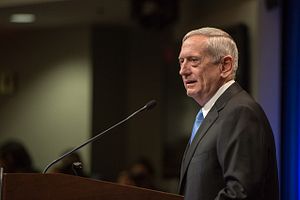U.S. President Donald Trump’s defense secretary, James Mattis, will head to South Korea and Japan later this week for his first visit to Asia. The choice of the two Northeast Asian treaty allies is a deliberate move by the Trump administration to bolster U.S. alliances early on.
Mattis will visit Seoul first on Thursday and Friday. After that, he will head to Tokyo. His Asia visit is expected to last for four days overall.
Mattis’ agenda in Seoul will focus on broadly reassuring South Korea of the United States’ ongoing commitment to the alliance. On January 29, Trump spoke with South Korea’s prime minister, Hwang Kyo-ahn, who is acting as president after former President Park Geun-hye’s impeachment following a political scandal.
According to a White House readout of the call between Hwang and Trump, the U.S. president reiterated the an “ironclad commitment” to the alliance and specifically underlined “the provision of extended deterrence, using the full range of military capabilities.” The latter refers to the United States’ commitment to use nuclear weapons to deter threats to South Korea.
When Mattis goes to Seoul, his focus will naturally be on the threat posed by North Korea, which carried out two nuclear tests and 24 ballistic missile tests in 2016 and may be on the verge of testing a nuclear-capable intercontinental ballistic missile (ICBM) this year. Mattis will additionally confer with his South Korean counterpart Han Min-koo, South Korea’s defense minister, about the Terminal High Altitude Area Defense (THAAD) system — a missile defense platform that China has strongly rejected.
Mattis and Han spoke on Tuesday about THAAD and the looming threat of a North Korea ICBM test. “Mattis’ decision to visit Seoul for his first overseas trip after being appointed as defense secretary will deliver a very timely and stern message to North Korea,” Han said after the call in a statement.
In South Korea, Mattis will additionally address the United States’ commitment to the upcoming iteration of the annual U.S.-South Korea Foal Eagle and Key Resolve exercises. North Korea regularly protests these exercises and has made their discontinuation an important strategic objective. North Korea partly fears that the exercises are used as a staging and preparatory drill for a preemptive attack against the regime in Pyongyang.
As Alex Ward argued in The Diplomat last week, Mattis’ scheduled trip to South Korea and Japan will effectively serve the purpose of apologizing for statements made by the U.S. president during the campaign. For South Korea, having Mattis reaffirm the alliance in Seoul will be a source of comfort amid Trump’s vacillations about the value of the United States’ Asian treaty alliances.

































